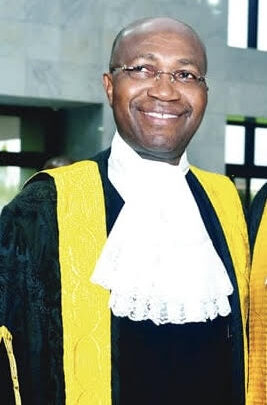Guest Columnist
WOLE OLANIPEKUN, GOD FACTOR AND POWER OF LAWYER’S INSTINCT, BY MIKE AWOYINFA
100 FAMOUS LAWYERS

100 FAMOUS LAWYERS:
WOLE OLANIPEKUN, GOD FACTOR AND POWER OF LAWYER’S INSTINCT
|
|
Chief Wole Olanipekun, SAN, widely regarded as a legal titan in Nigeria, embodies hard work, and the cultivation of an intangible quality he calls “lawyer’s instinct.” His thinking is not confined to the academic principles of law; rather, it is a practical, almost instinctual approach to litigation that prioritizes meticulous preparation, leadership, and a profound respect for both the profession and its practitioners.
The Spiritual and God-Factor in Law
Olanipekun’s legal thinking is heavily influenced by his Christian faith. He views his career as a divine calling, believing that God’s hand has guided his path from the very beginning. This conviction is more than just a personal belief; it is a foundational principle of his practice. He credits his success not to his own brilliance alone, but to a “God-factor” that provides him with wisdom, knowledge, and understanding beyond what is taught in any school.
This spiritual dimension manifests in several ways:
- Divine Guidance:He recounts how a providential meeting with a former lecturer, Professor Abiola Ojo, prevented him from switching from law to journalism, a decision he believes would have derailed his destiny.
- Source of Wisdom:He attributes his “lawyer’s instinct” to the Holy Spirit, seeing it as a spiritual endowment rather than a purely intellectual skill. He cites Psalm 119:19, “I have more knowledge than the ancients, I have more wisdom than my teachers,” as a personal mantra he has claimed to fuel his work.
- Humility and Gratitude:His faith instills humility. When faced with the respect of his peers, he remains grounded, acknowledging that his abilities are a gift. This perspective allows him to be a better leader, willing to listen to and learn from others.
For Olanipekun, faith is the wellspring of his legal prowess, providing a unique lens through which he approaches every case. He sees his work as a form of service guided by a higher power, which adds a layer of purpose and integrity to his practice.
The Unteachable: Acquiring “Lawyer’s Instinct”
Olanipekun’s most significant contribution to legal thought is his concept of “lawyer’s instinct.” He argues that while universities and law schools provide the essential “passport” (the degree and call to bar certificate), they do not teach the “visa” and “ticket” required for a successful journey in the profession. This instinct is an intuitive, almost reflexive ability to navigate the complexities of practice that only comes from experience.
Key aspects of this instinct include:
- Reading the Room:The ability to understand the mindset of a client, an adversary, or a judge without direct communication.
- Thinking on Your Feet:Instinctively knowing what questions to ask, what arguments to make, and how to react in the unpredictable environment of a courtroom.
- Sedimentary Accumulation of Knowledge:It is the result of years of practice, reading, and learning from both triumphs and mistakes. It is a form of tacit knowledge that cannot be codified in a curriculum.
He uses the analogy of a pilot: a single mistake—a wrong button pressed—can be fatal. Similarly, a lawyer’s carelessness can have devastating consequences for a client. This is why the instinct, honed through years of experience, is crucial. It is the professional equivalent of being “streetwise” and “smart” in a legal context.
The Art of Preparation and Leadership
Olanipekun views litigation as a military campaign. His preparation for a case is akin to a general planning for battle, leaving no stone unturned. This meticulousness is not just a personal trait; it is a standard he demands of his team.
His approach to leadership in litigation is based on:
- Team Collaboration:Despite his status, he believes in listening to every member of his team. He sees his role as a leader who synthesizes all ideas into a formidable strategy. The ultimate responsibility and public-facing role of presenting the case in court may fall on him, but the collective wisdom of the team is what underpins the strategy.
- Zero Tolerance for Laziness:He has no patience for mediocrity or tardiness. He holds his juniors to the same high standards he sets for himself, as even a small mistake, like a typo, can cost a case. He learned this lesson firsthand and it fuels his demand for excellence.
- Punctuality:He considers punctuality a non-negotiable part of professional discipline. Being on time for court is not a matter of convenience but a fundamental requirement for a lawyer’s mental stability and effectiveness.
This leadership style is not about being a one-man show. It’s about building a collective of highly competent individuals and leveraging their combined skills to achieve the best possible outcome.
Practical Skills and Professional Conduct
Beyond the spiritual and instinctual, Olanipekun emphasizes the importance of practical skills and professional conduct that are not taught in formal education. These are the “hidden keys to excellence” that define a great lawyer.
- Continuous Learning:A lawyer’s education doesn’t end with a law degree. The profession demands a thirst for knowledge, like a “parched sand” exercising its ability to retain information. He advocates for being a generalist, embracing the Nigerian system that requires lawyers to be vast in different areas of law, from maritime to chieftaincy, rather than specializing narrowly from the start.
- Humility to Learn from Others:He believes a good lawyer must appreciate what is good in others and be willing to learn from everyone, even opponents. The mindset should be “my knowledge stops where that of another begins,” which fosters respect and continuous growth.
- Interpersonal Skills and Decorum:The ability to relate well with people, from clients to judges, is paramount. He learned the value of tidiness and organization from the late Gani Fawehinmi, SAN, and stresses that these “streetwise” qualities are critical to a lawyer’s success.
- Understanding the Client:He highlights the volatile nature of clients, who can be “unstable as the British weather.” He recounts a story of a client who, upon hearing of his lawyer’s death, immediately hired a new one. This anecdote serves as a cautionary tale, urging lawyers to focus on their professional discipline and self-care, including their health, because a client’s loyalty can be fleeting.
The Art of Cross-Examination
Olanipekun’s thinking on cross-examination is a perfect example of his philosophy in action. He likens the cross-examiner to a general in battle, where instinct is key. The goal is to “disorient” and “unbundle the truth,” but never to abuse the witness.
Key tenets of his approach include:
- Tact and Strategy:A lawyer must instinctively know when to attack, when to hold a position, and when to retreat based on the witness’s demeanor and testimony.
- Testing Veracity:Cross-examination is the ultimate test of a witness’s credibility. It’s about using legal provisions and a keen eye to identify inconsistencies and expose falsehoods.
- Psychological Acumen:He talks about using “binoculars” to “foray into their inner recesses” to get to the truth. This is a highly psychological process that requires a deep understanding of human nature and a lawyer’s instinct.
In summary, the legal thinking of Chief Wole Olanipekun, SAN, is a masterclass in practical lawyering that goes beyond the classroom. It is a holistic philosophy that integrates spiritual conviction, a cultivated “instinct” born of experience, rigorous preparation, and disciplined professional conduct. It’s a way of life, not just a career, demanding continuous self-improvement and a profound respect for the “God-factor” that underpins every success. To think like Olanipekun is to be a lawyer who is not only a master of the law but also a student of life, a leader, and a person of deep faith. It is about activating one’s potential and embracing the journey of lifelong learning and growth in the legal profession.





